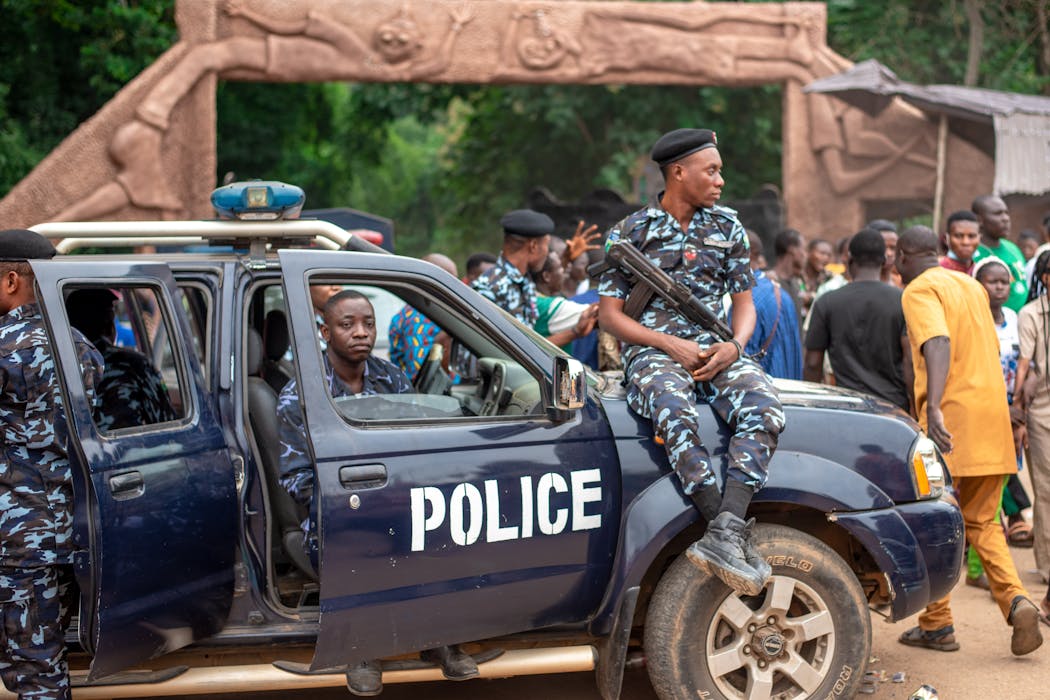
The US president, Donald Trump, is threatening military action in Nigeria over what he sees as the persecution of Christians there. He has accused the Nigerian government of not doing enough to prevent radical Islamists from committing “mass slaughter” against Christians in the west African nation.
In a video posted on social media on November 5, Trump said: “Christianity is facing an existential threat in Nigeria. Thousands and thousands of Christians are being killed. Radical Islamists are responsible.” He warned that, if US forces were to attack, it would be “fast, vicious, and sweet, just like the terrorist thugs attack our CHERISHED Christians!”
Riley Moore, a Republican US congressman who has been asked by Trump to lead an investigation into violence against Christians in Nigeria, has previously called the country “the most dangerous place in the world to be a Christian”. He claims that more than 7,000 Christians have been killed in Nigeria in 2025 alone – an average of 35 per day. Hundreds more have been kidnapped, tortured or displaced, he says.
But, regardless of whether or not these figures are correct (assessing their accuracy is difficult), the US government’s framing of the violence in Nigeria as Islamists killing Christians oversimplifies a complex reality. Violence in Nigeria is driven by more than religion alone, with land disputes, politics, ethnicity, historical grievances and inequality all playing a part.
Violence in Nigeria has varying motives. In the north-western and north-eastern regions of the country, attacks are largely carried out by jihadist groups such as Boko Haram, Lakurawa and Islamic State West Africa Province. These groups seek to establish an Islamic caliphate in the region, and attack whoever opposes their ideology – Christian or otherwise.
Boko Haram has historically been the dominant Islamist militant group in Nigeria. The Brookings Institution estimates that Boko Haram has killed tens of thousands of people in Nigeria since 2009, and has displaced more than 2 million others. The regions of Nigeria in which jihadist groups operate are predominantly Muslim.
The motives for violence in other areas of Nigeria, including the fertile agricultural Middle Belt region, are different. The Middle Belt, which is mostly Christian, is badly affected by violent conflict between sedentary farmers and nomadic herders. The herders, who tend to be Fulani Muslims, move their livestock from one region to another.
I have studied this particular type of conflict in Nigeria since 2018. Violent conflicts between these groups of people are driven by poor governance, inequality, historical grievances and environmental injustice – and it would be inaccurate to suggest they are entirely motivated by religion.
They are best understood as eco-violence. The two groups clash over access to and control of water points and land, which leads to mass killings and the destruction of settlements. The Trump administration’s grouping of Nigeria’s violence together under the label of Islamist extremism is thus misleading.
Nigeria’s Middle Belt region:
The Middle Belt has become one of Nigeria’s most violent regions. Armed herder groups have been accused of staging attacks on farming communities that have resulted in mass murders, the burning of homes and barns and the displacement of millions of people.
In some areas, attackers have taken over and resettled in captured communities. Farmers have destroyed herds of livestock worth thousands of US dollars in retaliation, and have killed herders.
According to Amnesty International, over 10,000 people have been killed in attacks across the Middle Belt since 2023, with Benue and Plateau states accounting for the vast majority of these deaths.
In June 2025, armed attackers stormed the farming village of Yelwata in Benue state, killing around 200 people in the space of a few hours. Then, in early November, 17 people were killed by armed men believed to be Fulani herders in the farming settlement of Kwi and the town of Damakasuwa. Both of these places are located near the border between Plateau and Kaduna states.
A few days later, after Trump had threatened military action in Nigeria, suspected armed herders killed at least seven people in an attack on Anwuel village in Benue state. Herders have also been accused of carrying out attacks in other regions of Nigeria, including the south-west and south-east.

Amnesty International has blamed the escalating violence in Nigeria on the “shocking failure” of the country’s authorities to protect lives and property from attacks by armed groups and bandits. Rural communities say that Nigerian security agencies often fail to protect them, even when they are warned of impending or ongoing attacks.
However, Nigerians do not need a foreign saviour. What the country needs is a new constitution. The current constitution was created by a military administration, not through a democratic process. Many people have argued that it lacks legitimacy and centralises excessive power at the federal level.
This concentration of power has fuelled corruption, nepotism and generally poor governance, resulting in the rampant insecurity seen in Nigeria today. Nigeria needs an inclusive, democratically drafted constitution that reflects the will of its people.
It is troubling that it has taken a threat by the US president to again remind Nigerian leaders of their duties to protect civilians. But hopefully this results in better security and support for victims of violence in rural communities across Nigeria.
This article is republished from The Conversation, a nonprofit, independent news organization bringing you facts and trustworthy analysis to help you make sense of our complex world. It was written by: Ezenwa E. Olumba, Aston University
Read more:
- Is there a Christian genocide in Nigeria? Evidence shows all faiths are under attack by terrorists
- Why insurgent groups in northern Nigeria continue to kidnap school children
- Nigeria’s deadly conflicts over water and grazing pasture are escalating – here’s why
Ezenwa E. Olumba does not work for, consult, own shares in or receive funding from any company or organisation that would benefit from this article, and has disclosed no relevant affiliations beyond their academic appointment.


 The Conversation
The Conversation
 The Hill Video
The Hill Video Newsweek Top
Newsweek Top Washington Examiner
Washington Examiner  Associated Press Top News
Associated Press Top News Local News in California
Local News in California Local News in Kentucky
Local News in Kentucky Raw Story
Raw Story Asheville Citizen Times
Asheville Citizen Times Mediaite
Mediaite Fortune
Fortune RadarOnline
RadarOnline